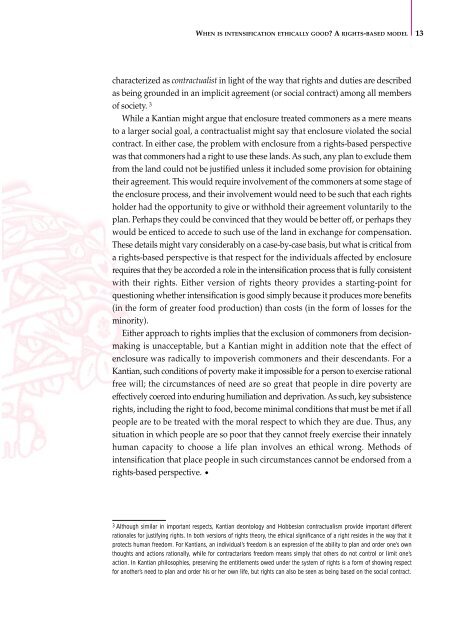Ethics of Sustainable Agricultural Intensification - FAO.org
Ethics of Sustainable Agricultural Intensification - FAO.org
Ethics of Sustainable Agricultural Intensification - FAO.org
Create successful ePaper yourself
Turn your PDF publications into a flip-book with our unique Google optimized e-Paper software.
WHEN IS INTENSIFICATION ETHICALLY GOOD? A RIGHTS-BASED MODEL 13characterized as contractualist in light <strong>of</strong> the way that rights and duties are describedas being grounded in an implicit agreement (or social contract) among all members<strong>of</strong> society. 3While a Kantian might argue that enclosure treated commoners as a mere meansto a larger social goal, a contractualist might say that enclosure violated the socialcontract. In either case, the problem with enclosure from a rights-based perspectivewas that commoners had a right to use these lands. As such, any plan to exclude themfrom the land could not be justified unless it included some provision for obtainingtheir agreement. This would require involvement <strong>of</strong> the commoners at some stage <strong>of</strong>the enclosure process, and their involvement would need to be such that each rightsholder had the opportunity to give or withhold their agreement voluntarily to theplan. Perhaps they could be convinced that they would be better <strong>of</strong>f, or perhaps theywould be enticed to accede to such use <strong>of</strong> the land in exchange for compensation.These details might vary considerably on a case-by-case basis, but what is critical froma rights-based perspective is that respect for the individuals affected by enclosurerequires that they be accorded a role in the intensification process that is fully consistentwith their rights. Either version <strong>of</strong> rights theory provides a starting-point forquestioning whether intensification is good simply because it produces more benefits(in the form <strong>of</strong> greater food production) than costs (in the form <strong>of</strong> losses for theminority).Either approach to rights implies that the exclusion <strong>of</strong> commoners from decisionmakingis unacceptable, but a Kantian might in addition note that the effect <strong>of</strong>enclosure was radically to impoverish commoners and their descendants. For aKantian, such conditions <strong>of</strong> poverty make it impossible for a person to exercise rationalfree will; the circumstances <strong>of</strong> need are so great that people in dire poverty areeffectively coerced into enduring humiliation and deprivation. As such, key subsistencerights, including the right to food, become minimal conditions that must be met if allpeople are to be treated with the moral respect to which they are due. Thus, anysituation in which people are so poor that they cannot freely exercise their innatelyhuman capacity to choose a life plan involves an ethical wrong. Methods <strong>of</strong>intensification that place people in such circumstances cannot be endorsed from arights-based perspective. •3 Although similar in important respects, Kantian deontology and Hobbesian contractualism provide important differentrationales for justifying rights. In both versions <strong>of</strong> rights theory, the ethical significance <strong>of</strong> a right resides in the way that itprotects human freedom. For Kantians, an individual’s freedom is an expression <strong>of</strong> the ability to plan and order one’s ownthoughts and actions rationally, while for contractarians freedom means simply that others do not control or limit one’saction. In Kantian philosophies, preserving the entitlements owed under the system <strong>of</strong> rights is a form <strong>of</strong> showing respectfor another’s need to plan and order his or her own life, but rights can also be seen as being based on the social contract.
















